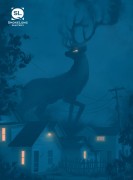“A Boy Who Does Not Remember His Father” deals with the issue of deportation. What prompted you to write about this subject? In other words, where did the idea for this story come from?
I began this story long before the election, but the ideas relate to today’s climate more than ever. I was thinking about ways children are separated from parents, and deportation—something that gives little concern for the human lives involved—seemed particularly important to showcase. I was interested in exploring this issue through the eyes of a child who, despite his circumstances, maintains a strong sense of idealism and innocence. While in the story it isn’t clear if this is because he doesn’t understand the situation, or because he’s able to rise above it, he’s still able to feel a certain amount of freedom and empowerment despite the apparent tragedy. I wanted to tell the story of a child who, regardless of the reality, has a hopeful and optimistic vision of a parent he’s never known.
The characters in your story are not given names. Instead, they are referred to as “father,” “mother,” and “boy.” What was your intent behind leaving the characters unnamed?
The first line came to me almost exactly as it currently appears—this is often the case for me with flash fiction—and the characters remained nameless through every draft of the story. I think part of the power of this particular story comes from the use of these more general terms (“boy,” “mother,” “father”), which are universal in all of our lives. Also, the boy’s own interest in storytelling and his perception that his father would also be a storyteller seems to align with the namelessness of the characters and to evoke that kind of mythical, archetypal quality.
The story’s final paragraph masterfully emphasizes the boy’s tendency to romanticize the absence of his father. The idea of this absence being a “freedom” gifted to the boy really resonated with me, as I’m sure it will with other readers. What inspired this idea and how is it central to the overall concept of the story?
The story and that idea—especially the ending—were in part inspired by my own long-distance relationship with my father when I was a child and the way I’ve learned to see that situation (and him) differently over the years. While an absence can feel like a hole in your life, in many ways it’s also full of possibility—the possibility of filling it with whatever you’d like or could imagine. But I was also intrigued by the complexity and debatable truth of that idea: Is this kind of absence in a child’s life ever positive? Is the boy’s romanticized sense that he is choosing his own father and can have any father he wants helpful? Is this kind of optimism and freedom from the reality of the situation something that can be sustained? Or, to go even further, what if his mother is wrong, his father innocent? There is something hopeful about how the boy never gives up on his father and refuses to, despite his mother’s insistence. He doesn’t know both sides of the story, and he maintains the freedom to see his father how he chooses. I was interested in all of these ideas and possibilities.
What are you currently reading? How, if at all, do your reading practices affect your writing process?
I just finished Seth Fried’s hilarious and imaginative story collection The Great Frustration, which masterfully blends the comedic and the philosophical, and I’m about to start Magic for Beginners (Kelly Link). And yes, reading definitely affects my writing process! Whatever I’m reading gets me thinking about pretty much every aspect of craft and story, particularly plot and structure. I’m constantly studying how the authors I love accomplish the feats they do on the page.
On average, how long does it take you to write a story? Do you believe in writer’s block?
It takes me anywhere from a few months to a couple years to finish a story. Every now and then, there’s that rare story that comes out of nowhere and is complete in a few days, but that’s the unicorn of writing experiences. I generally have so many short pieces going at once that each one gets a lot of space in between drafts, which I find crucial to the process.
Instead of thinking of it as writer’s block, I like to think that most writers have different periods that feel more or less prolific. For me, the key is working every day, but allowing how I work and what I work on to shift, depending on what’s flowing. Also, when things are not flowing, I often tweak or edit almost-finished pieces, instead of generating new work. If I can find an access point into the work, however small—even if it’s just revising a certain sentence—that often dissolves whatever block I feel. I think the idea of writer’s block is often linked to the expectations we put on ourselves, and the sense that we’re not living up to them. If those expectations shift—and your task today is to rework several sentences instead of write two thousand words—then suddenly there is less at stake, and before you know it, you’re often back in the flow.



 The core workshop of SmokeLong Fitness is all in writing, so you can take part from anywhere at anytime. We are excited about creating a supportive, consistent and structured environment for flash writers to work on their craft in a community. We are thrilled and proud to say that our workshop participants have won, placed, or been listed in every major flash competition. Community works.
The core workshop of SmokeLong Fitness is all in writing, so you can take part from anywhere at anytime. We are excited about creating a supportive, consistent and structured environment for flash writers to work on their craft in a community. We are thrilled and proud to say that our workshop participants have won, placed, or been listed in every major flash competition. Community works.